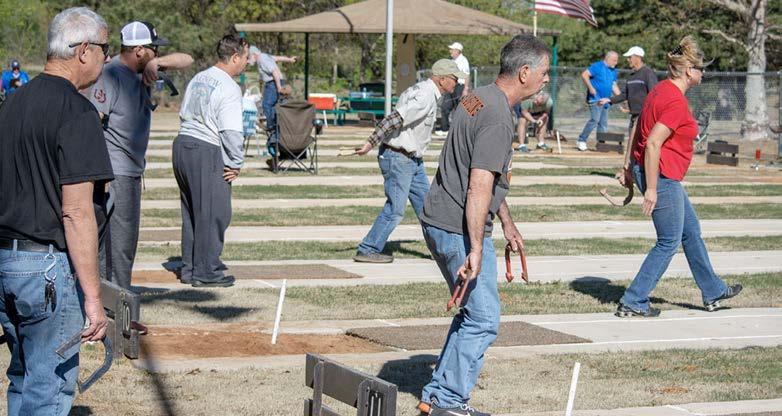
6 minute read
Next Steps
The concept plan for Wild Horse Park is a starting point for further community conversation about the design of the park. The final details of park design will depend on a closer analysis of the site.
This section provides some guidance on how to estimate costs, how to identify funding sources and revenues, and how to find more guidance on parks and recreation.
Advertisement
Finally, this section looks at a few nearby parks that can be reviewed closely to understand how they constructed park facilities within a budget using local resources.
Estimating Costs
Element
Gravel Parking Asphalt Parking
8-12’ Asphalt Trails 4-5’ Concrete Sidewalks Concept Plan Trails
Picnic Shelter & Tables New Restroom Bldg
Low Range
$1 $3
$70 $60 $175,000
$20,000* $150,000*
Higher Range
$3 $5
$150 $80 $250,000
Trail Cost Precedents
Spring Creek Trail - Edmond
3.1-mile trail, 18’ in width, with designated space for walking, biking, jogging. Constructed in 2017 at a cost of $3.2 million, or about $11 per square foot of trail.
Bang for Your Buck
Park costs can be reduced by selecting lower-cost materials, finding material and labor donations, and identifying improvements that can be implemented with the help of volunteer labor from community members or groups like Boy Scouts and Girl Scouts.
Enid discovered a low-cost, high-impact improvement. Meadowlake Park has installed about 16 horseshoe pits and now hosts statewide horseshoe tournaments drawing hundreds of attendees. Each pad costs about $400. Bocce ball and disc golf are similar low-cost activities gaining in popularity. Route 66 Trail - Yukon
1 mile trail, 10’ in width for multipurpose use. Constructed with an 80% state (ODOT) match and a total cost of $840,000 or $16 per square foot of trail.
Unit
per sf per sf
per linear ft per linear ft for approximately 2,800 feet
Based on Enid Parks Master Plan (2013) Based on Enid Parks Master Plan (2013)
Specht Park Trail - Fairview
0.6-mile trail, 8’ in width in a local park. Constructed in 2016 with TSET grant funds, city funds, and private donations at a cost of $210,000, or about $8 per square foot of trail.
Trail System - Enid
Over the last five years, Enid has installed about 12 miles of trail for about $5.5 million. This is about $90 per linear foot of trail.
Funding and Revenue Sources
Park Revenues
Many local communities charge users for use of local park facilities for events or league use. For example, based on a survey of parks in Edmond, Harrah, Choctaw, and Yukon, a covered picnic pavilion can be rented $20 to $75 dollars per half day depending on size and amenities.
Local Contributions
Local contributions may come from a variety of sources. Check with local businesses, service providers, banks, utility providers, nearby auto dealerships, charitable foundations, etc. Don’t forget the value of in-kind contributions of materials, equipment, and labor from skilled local workers.
Oklahoma County
Oklahoma County may be a resource for certain park infrastructure like new or improved streets.
Land & Water Conservation Fund Grant
Oklahoma Tourism & Recreation Department Division of State Parks Susan Henry, Grant Administrator (405) 522-9521 susan.henry@travelok.com
The Division of State Parks distributes the federal funds for this grant. The grant reimburses up to 50% of expenses from projects that include acquisition of land and/or development of outdoor recreation facilities. Facilities might include sports facilities, playgrounds, campgrounds, trails, swimming facilities, splash pads, etc.
Recreational Trails Program
(Same Contact Info as Above)
This grant reimburses up to 80% of the costs of developing a recreational trail with a 20% local match.
Transportation Alternatives Program
Oklahoma Department of Transportation https://www.ok.gov/odot/Doing_Business/Local_ Government_Resource_Center/Transportation_ Alternatives_Program_(TAP)/index.html
This program funds recreational trails and transportation enhancements from federal funds.
Placemaking Grant
National Association of Realtors https://realtorparty.realtor/community-outreach/ placemaking
Up to $5,000 is available for parks, trails, play, and fitness areas. The local Realtor Association must be engaged in order to apply.
TSET Healthy Incentive Grants for Communities
https://tset.ok.gov/content/healthy-communitiesincentive-grants
Sponsored by Oklahoma’s Tobacco Settlement Endowment Trust, these funds can construct public facilities related to health and wellness, like walking trails, farmers markets, or sports and recreation facilities. After meeting certain criteria, communities become eligible for varying levels of funds. Communities that are more proactive about healthy living policies are eligible for more funds.
AARP Community Challenge
AARP Livable Communities https://www.aarp.org/livable-communities/communitychallenge/
The AARP Community Challenge funds over 150 community projects each year. The program funds projects for public space, bike/walk mobility, and housing that have fast implementation schedules.
OGE Energy Corp. Foundation Grants
(405) 553-3493 ogeecfd@oge.com
OGE Energy Corp. Foundation provides grants to support quality of life and economic well-being in OGE Communities. Capital improvements costs are ineligible, but this program could provide support to park programming.
Rural Economic Action Plan (REAP)
Association of Central Oklahoma Governments (ACOG) Matthew Weaver, (405) 234-2264
REAP Grants are authorized by the Oklahoma Legislature for funding small, rural communities with less than 7,000 in population. ACOG manages distribution of these funds in central Oklahoma. Grants do not require a local match, and can be used for a wide variety of public projects including transportation and community buildings.
Oklahoma Parks & Recreation Society
The Oklahoma Parks & Recreation Society is an organization for professionals who engaged in parks and recreation. Members include government staff at all levels, non-profits, and vendors who sell park equipment or materials.
OPRS has an annual conference in the fall that also includes a vendor and trade show where attendees can chat with park vendors.
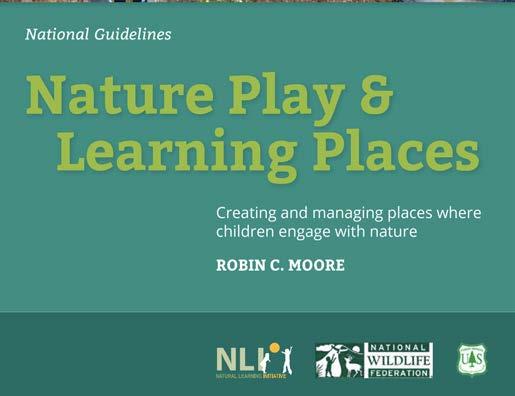
National Guidelines on Nature Play & Learning Places
https://natureplayandlearningplaces.org/
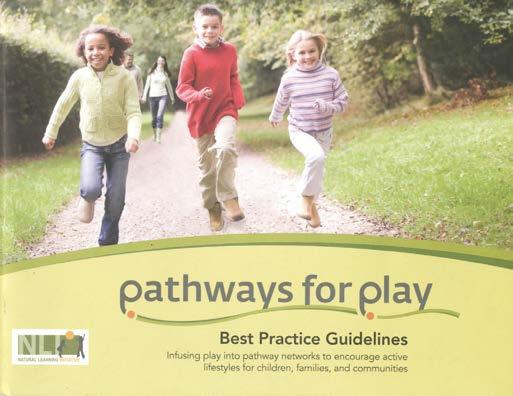
Pathways for Play: Best Practices Guidelines
https://natureplayandlearningplaces.org/pathways-forplay/
This document shows how trails can also include places for play and exploration in nature.
This document explains practices on the creation and management of nature play spaces.

Naturegrounds Guidebook
https://www.playandpark.com/naturegrounds-guidebook
This document is about integrating manufactured play equipment with natural landscapes and nature.
Case Study Parks
Beaty-Mulhausen Community Park
Jones, Oklahoma 9.7 miles southwest
A ½ mile walking trail circles the central pond with intermittent lighting and benches. The main covered picnic pavilion features attached restrooms, and smaller individual covered picnic tables are nearby. A secondary covered pavilion also has additional picnic tables. Basketball court with portable toilet and night lighting. A row of gravel parking is provided off of the main road (Britton Road).
Edmond 66 Park
Edmond, Oklahoma 9 miles west
Four-field softball complex in cloverleaf pattern. Central concession stand, restrooms, and covered seating in Route 66 themed architecture. League and tournament play. 60’x60’ covered playground. Approximately 300 parking spaces.
600 ft
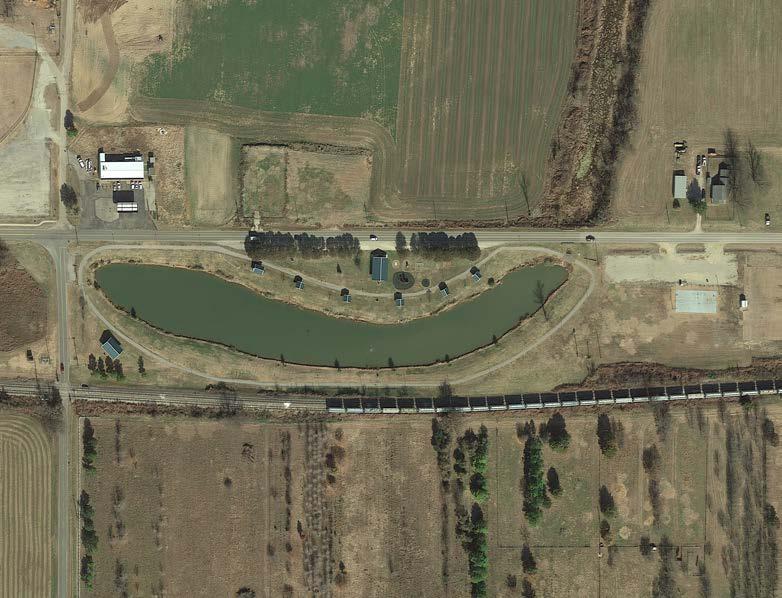
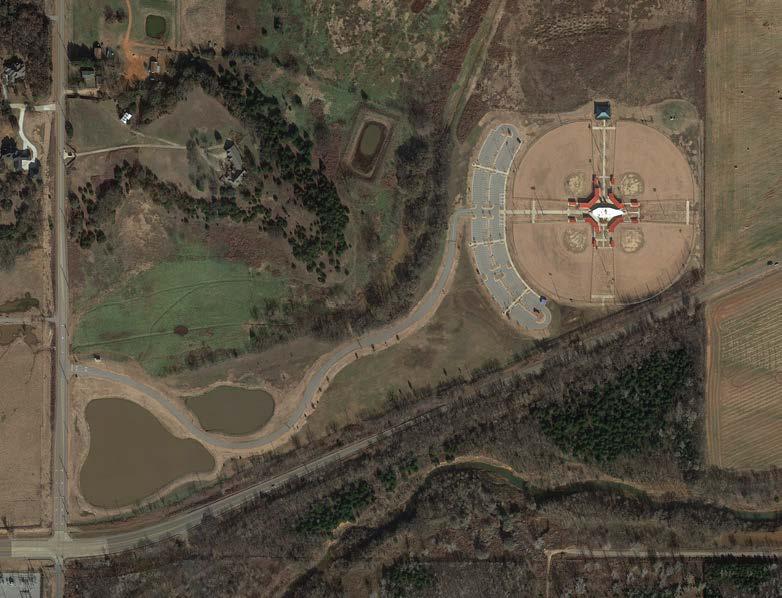
1000 ft
Heritage Park
Harrah, Oklahoma Approximately 17 acres
An amphitheater faces a central pond. Concession and covered picnic pavilion. Permanent restroom building with drinking fountains. Splash pad. Two playground equipment areas. Two lit basketball courts. Flexible lawn space. Multiple trail loops throughout with lighting, benches, and landscaping. Parking lot with approximately 50 spaces.
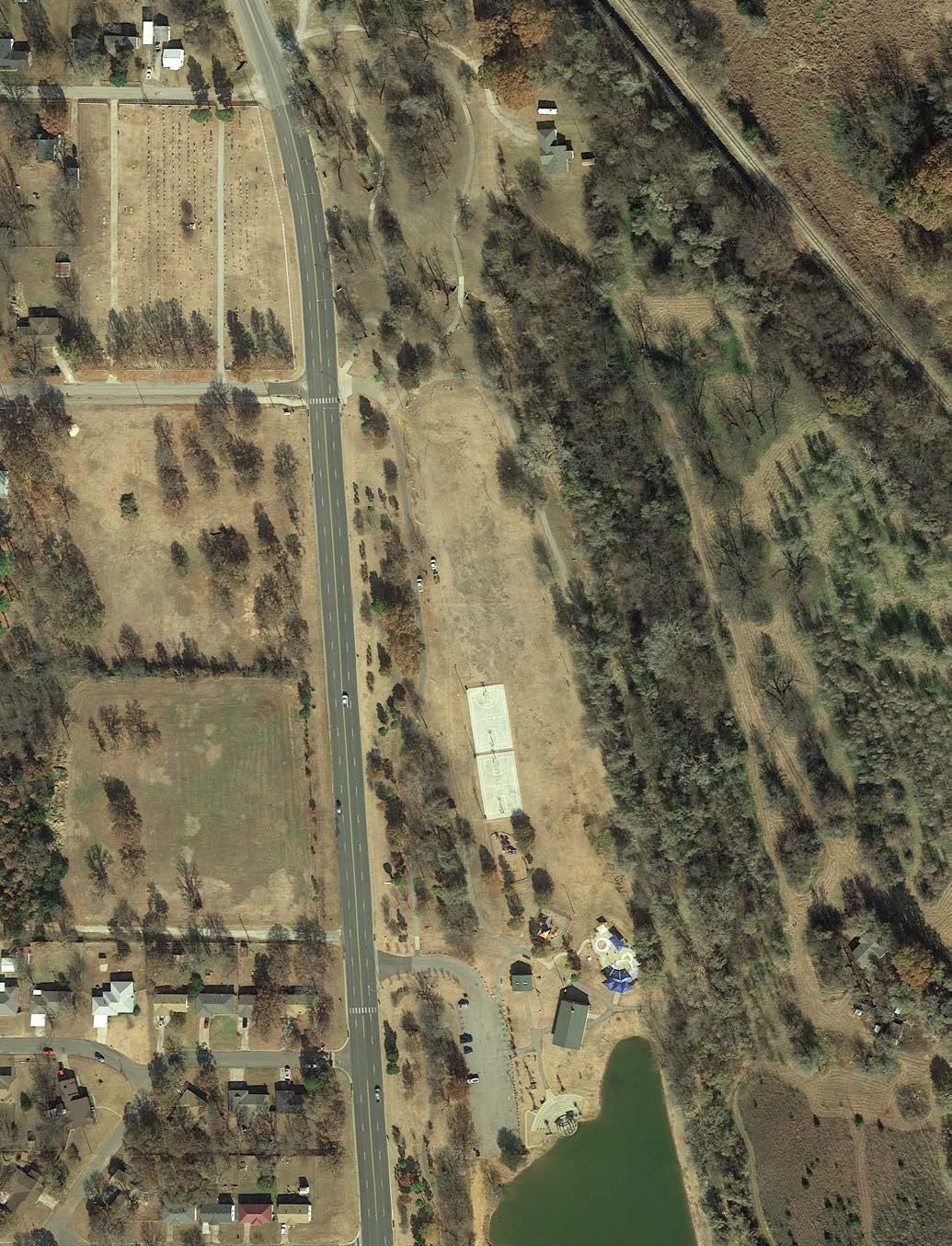
Report prepared by:
OU Institute for Quality Communities OU Christopher C. Gibbs College of Architecture
830 Van Vleet Oval Gould Hall 165 Norman, OK 73019



